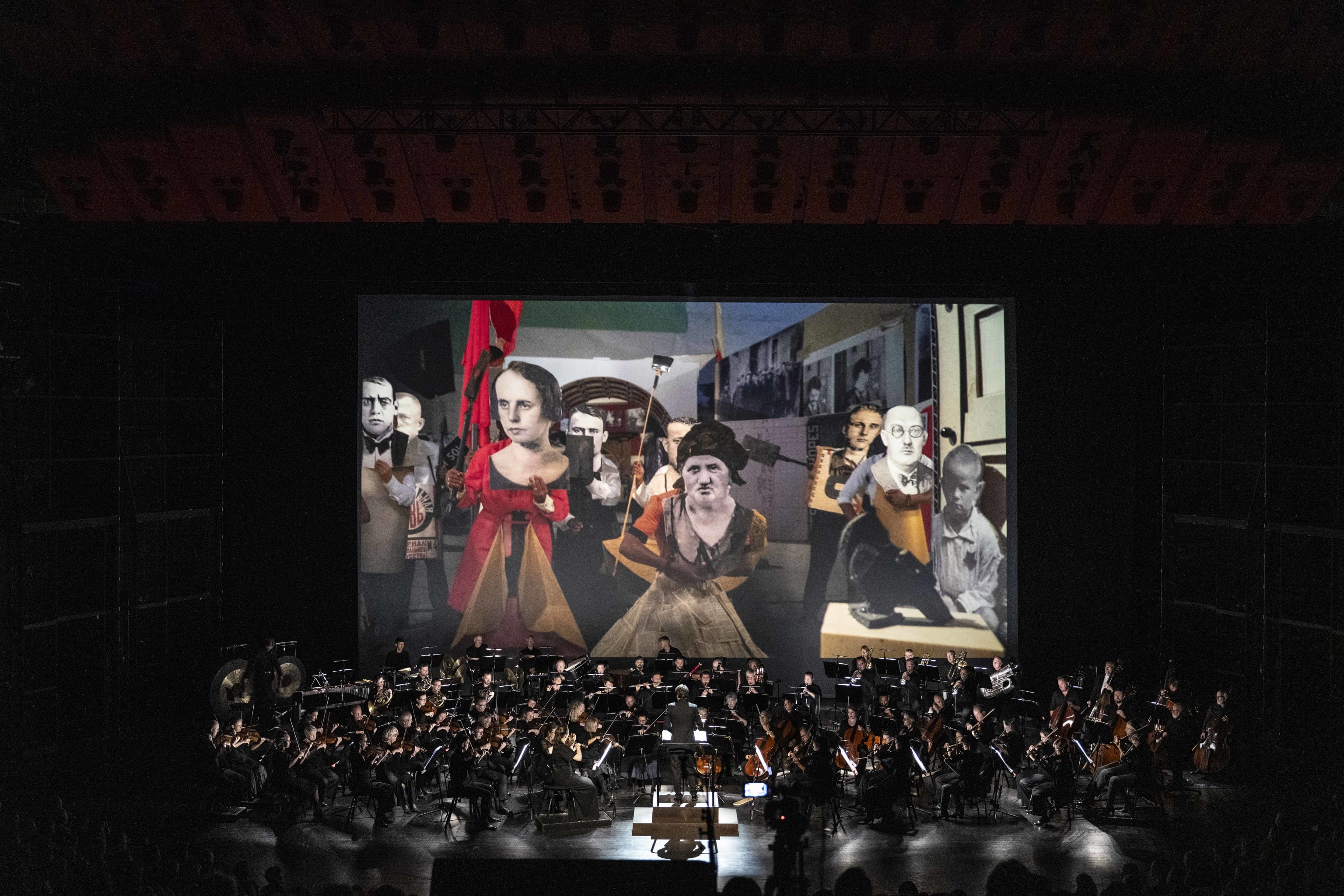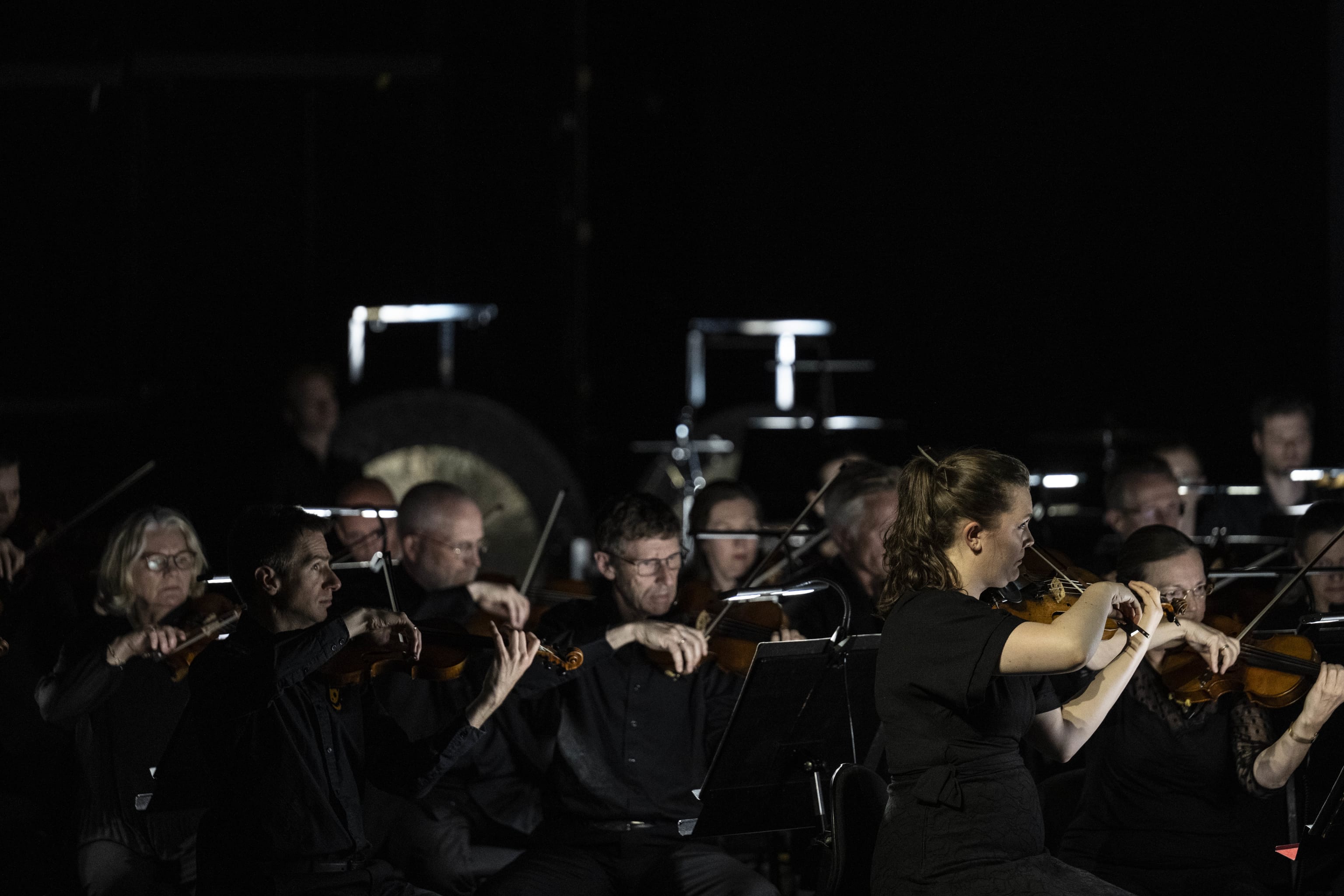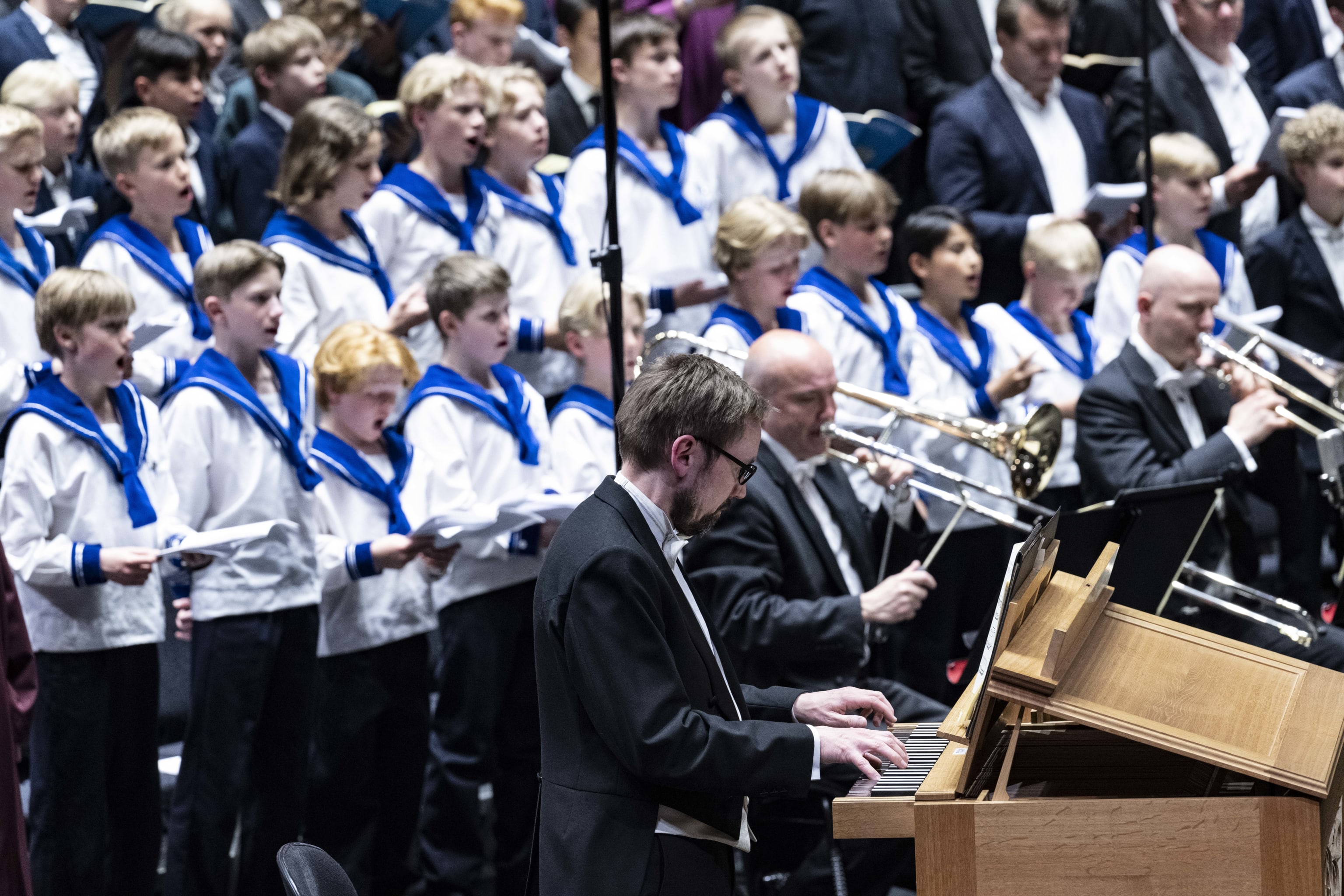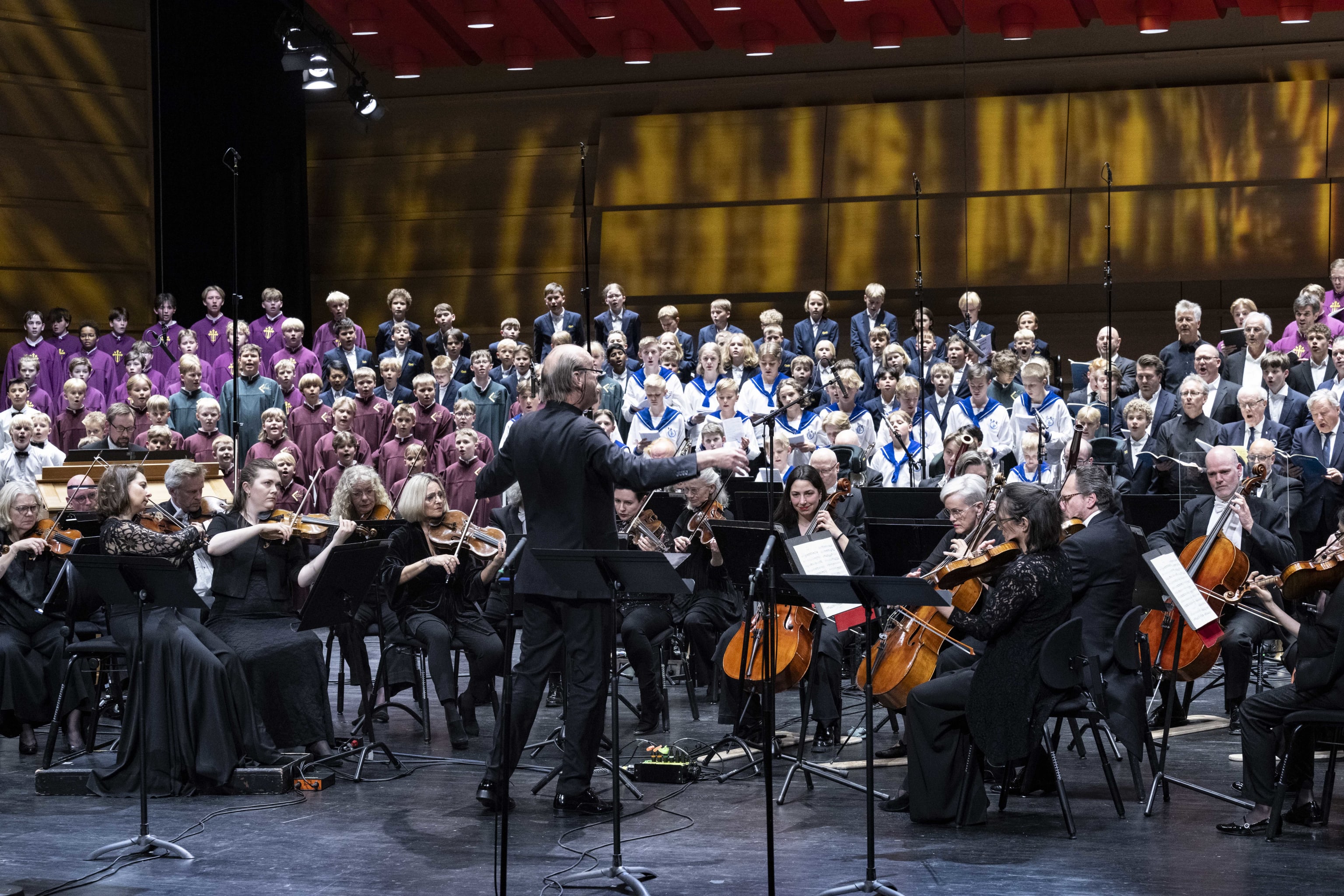Bergen Philharmonic Orchestra
Festival Musicians 2026
- By:
Morten Hammerborg, history professor at Høgskulen på Vestlandet,
October 13, 2025
They are one of the world’s oldest orchestras, mentioned in Edvard Grieg’s will, and today they are the pride of Bergen: a towering musical institution among the seven mountains. The Festival Musicians of 2026 are the Bergen Philharmonic Orchestra.
– We are delighted to present – not one – but 101 festival musicians in 2026! Namely all the musicians of the Bergen Philharmonic Orchestra, says Festival director Lars Petter Hagen.
The city’s own orchestra has achieved numerous successes in recent years through critically acclaimed recordings, major international tours, and is this fall nominated for the prestigious title “Orchestra of the Year” by the British magazine Gramophone. The Bergen Philharmonic Orchestra and the Bergen International Festival have always been closely intertwined. Without the orchestra, it is inconceivable that the Festival could have been launched in 1953, and in nearly every year since, the orchestra has been a central performer in the festival’s programming. It is with great pleasure that Bergen International Festival announces the Bergen Philharmonic Orchestra as Festival Musicians of 2026.
Buy tickets for 2026
The world’s oldest orchestra
The Bergen Philharmonic Orchestra, also known as “Harmonien” (meaning “the harmony”), is one of the world’s oldest orchestras. Its origins can be traced back to October 8, 1765, when “a small voluntary musical society” held its first concert on the initiative of the headmaster of the Cathedral School, Jens Boalth. The society was inspired by orchestras in Copenhagen and by a new bourgeois culture on the continent, where it was fashionable to cultivate theater and music.
It had also been a turbulent year in Bergen. In April, the so-called Strilekrigen had given the city a taste of riots and a breakdown of social order, when 4,000–5,000 angry striler (rural folk from the Bergen area) and townspeople protested an extra tax imposed by the king, and both the governor Cicignon and the city bailiff Bildsøe were attacked. At the final aria in October 1765, the last lines read: 'We shall not take revenge; our revenge consists in leaving the Striler to hate the Harmony.'
It would take many years before Bergen Philharmonic Orchestra developed into a professional orchestra and assumed the form of the ensemble we know today. When the city’s great son, Edvard Grieg, took over in 1880, the orchestra consisted of about 50 musicians, many of whom were multi-instrumentalists and mostly amateurs. For a long time, amateurs were preferred over professional musicians. The dilettante (from Italian, ‘person loving the arts’) – a citizen cultivating the fine arts alongside their business or office – was an 18th-century ideal that gradually gave way to the notion that performers should devote themselves fully to their art as a profession. Bergen Philharmonic Orchestra was as much a social institution for the city’s upper classes as it was a music orchestra.
Edvard Grieg’s high standards
Due to Grieg’s high demands and the level of professionalism of his performers, it was not long before tensions arose. After a successful opening concert – prompting the local paper Bergensposten to declare a 'new era' had begun – Grieg scheduled two works that would require a great deal from the orchestra’s choir. At the rehearsal on December 7, 1880, it turned out that nine of the choir’s 'young ladies' were absent. Grieg soon learned that they had chosen to attend a Christmas ball rather than the rehearsal. The next day, he summoned the orchestras powerful board and presented a letter he intended to send to the young women, effectively dismissing them from the choir.
Grieg got his way, but the press was filled with articles and letters to the editor, some supporting the effort to improve the city’s orchestra and choir, and others denouncing Grieg as a tyrant with no understanding of young people’s social obligations. As one letter stated: '[Grieg’s] zeal for music makes him forget the considerations relevant and decisive for the well educated circles of society.'
Although Grieg prevailed in the 'ball ladies' incident, he grew weary of repeated confrontations with the board and resigned from Bergen Philharmonic Orchestra in 1882. When he organized Norway’s first Musikfest in Nygårdsparken in 1898, he chose not to involve the orchestra, instead inviting the Concertgebouw Orchestra from Amsterdam to show his home city and country what it meant to compete among the world’s finest orchestras. Until his death in 1907, Grieg worked to lay the foundation for a fully professional orchestra in Bergen, including establishing the Edvard Grieg Fund with money he received as a public gift for his 60th birthday. His will further stipulated how the inheritance of him and his wife Nina should be used to fulfill the dream of a professional Bergen Philharmonic Orchestra, ensuring that 'its concerts as the center of Bergen’s musical life are secured for all time.'
Interwar period and financial strength
However, it was not until after the orchestra’s 150th anniversary in 1915, combined with the wealth of the city’s shipowners and the substantial tax revenue during World War I, that real breakthroughs occurred. Under the leadership of shipbroker Fridtjof Sundt, with generous donations from shipowners Johan Ludvig Mowinckel and Haakon J. Wallem, Bergen Philharmonic Orchestra managed a jubilee fund of more than 500,000 Norwegian kroner by the end of the war.
In 1917, the wealthy Bergen municipality established an operating fund of half a million Norwegian kroner for the orchestra – an unimaginable sum under any circumstances other than wartime. By 1919, the orchestra could launch 'Bergen’s permanent symphony orchestra' with 40 professional musicians. Conductor Harald Heide recruited musicians, including a dozen from German orchestras that had been disbanded after the war. The era of amateurs was over in Bergen, and in the following decades Bergen Philharmonic Orchestra grew steadily in size and quality.
The start of Bergen International Festival
The establishment of Bergen International Festival in 1953 further contributed to the orchestra’s development. Only one thing had eluded the orchestra in the decades since Grieg’s death: a dedicated concert hall. Grieg had championed this since the 1890s, but it was the National Theatre that succeeded in acquiring land and constructing a new building in the early 1900s. The orchestra therefore had to perform in Konsertpaleet, which most of the time functioned as a cinema with 1,200 seats. The acoustics were unsuitable for orchestral music, so changes were necessary before hosting a festival. The festival brought in an acoustics engineer from Oslo and secured funding from the municipality and Bergen Kinematografer for a system of movable walls, significantly improving the acoustics.
Bergen Philharmonic Orchestra’s debut at Bergen International Festival
The 1953 Bergen Internation Festival was a triumph for Bergen Philharmonic Orchestra. The orchestra was strengthened to 66 musicians for the occasion and, according to critics, had never played better. The previously criticized Konsertpaleet was praised for its acoustics and immediately declared the best orchestral hall in the country. Under new conductor Carl Garaguly, the orchestra reached 'a technical level few had thought possible' at the closing concert on June 15, 1953. The renowned Swedish music expert Sten Broman expected a 'mediocre provincial orchestra', but was astonished, declaring in the press that he preferred them over the philharmonic orchestra from the capitol.
In 1978, Grieghallen was completed. Finally, the orchestra had a permanent home – a true concert hall with superb acoustics. “A clarity and fullness never before heard from Bergen Philharmonic Orchestra in Bergen,” wrote Reidar Storaas. Karsten Andersen, chief conductor 1964–85, had the pleasure of leading the orchestra when the dream of Grieghallen was realized. In 1995, Bergen Philharmonic Orchestra was designated one of the country’s two national orchestras, securing state funding as its primary financial base.
Path to international success
It was only after the turn of the millennium that the Bergen Philharmonic Orchestra stepped onto the world stage. Under Andrew Liton’s leadership (2003–2015), the orchestra gained a reputation as world-class through extensive tours and recordings leading up to its 250th anniversary in 2015. Thanks to the orchestra’s high quality and prestige, his successor became the British conductor Edward Gardner, internationally recognized as one of the world’s foremost chief conductors.
Today, the Bergen Philharmonic Orchestra enjoys exciting times while searching for its next chief conductor. It is regarded as one of the world’s top orchestras and increasingly takes a prominent place in Bergen and in the lives of it’s citizens. The orchestra features at major city events, from the Bergen International Festivals opening at Torgallmenningen to free concerts in Nygårdsparken and the celebration of Gamlehaugen as a royal residence. Through its tours, the Bergen Philharmonic Orchestra brings Norwegian culture to the world, while offering Bergen audiences access to global cultural expressions at Grieghallen.
In 1898, Grieg would not engage the city’s orchestra. Today, he would have entrusted the Bergen Philharmonic Orchestra with even the most ambitious concert programs without hesitation. The Bergen International Festival is proud to name the Bergen Philharmonic Orchestra as 2026 Festival Musicians
In 2026
As Festival Musicians at the 2026 Bergen International Festival, the orchestra will both open and close the festival. The opening concerts at Grieghallen feature the orchestra and conductor Esa-Pekka Salonen, performing Olivier Messiaen’s magnificent Turangalîla-Symphonie in its entirety, along with the Prelude and Liebestod from Wagner’s Tristan und Isolde. There will also be two performances of Mahler’s Symphony No. 2, conducted by Salonen, who performed it as his farewell concert with the San Francisco Symphony earlier in 2025. For these performances, the Bergen Philharmonic Orchestra will be expanded with a large choir to meet Mahler’s spectacular requirements.
The closing concert has not yet been announced, but it is no secret that the Bergen Philharmonic Orchestra and Grieg’s Piano Concerto in A minor will feature – as always. Further program details will be released: sign up to our newsletter for presale access and early program news.





























